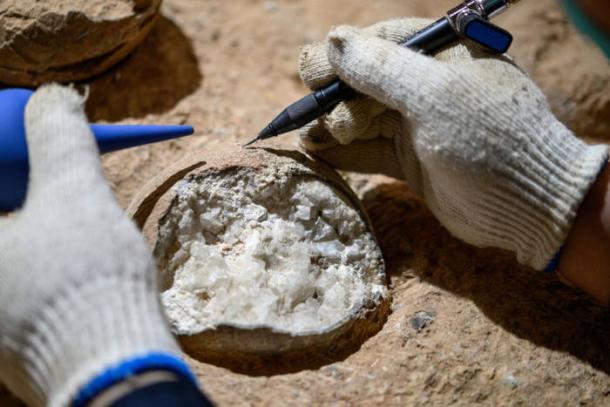Science
Chinese Scientists Date Dinosaur Eggs to 85.91 Million Years

Scientists in China have made a significant advancement in paleontology by successfully dating dinosaur eggs, establishing their age at an impressive 85.91 million years. This marks the first time researchers have directly dated dinosaur eggs, a breakthrough that could reshape our understanding of dinosaur evolution and the climatic conditions of the Late Cretaceous period.
The research was conducted on specimens from the Qinglongshan site, located in Hubei Province. The team employed an innovative “atomic clock” dating technique, which has the potential to enhance our comprehension of ancient biological and environmental dynamics. Notably, the eggs belong to the species Placoolithus tumiaolingensis, providing vital information about a crucial timeframe when Earth experienced significant climate changes.
Implications for Paleontology and Climate Studies
The discovery of these eggs contributes to an evolving narrative about the conditions leading to the extinction of dinosaurs. During the Late Cretaceous, the planet underwent dramatic cooling, which may have played a role in altering habitats and food sources for these ancient creatures. By examining the eggs, scientists can gain insights into how these species adapted to their environments during this tumultuous period.
The clutch found at the Qinglongshan site contains 28 eggs, with the majority identified as belonging to Placoolithus tumiaolingensis. This finding not only enriches the fossil record but also underscores the importance of advanced dating methods in paleontological research.
The research, published in the journal Frontiers, was led by paleontologist Bi Zhao and his team. Their work highlights the significance of direct dating techniques, which provide more accurate timelines for the study of ancient life forms. This method contrasts with indirect dating, which often relies on surrounding geological formations that can lead to uncertainties.
The implications of this study extend beyond dinosaurs, offering potential insights into the broader biological and climatic shifts that occurred millions of years ago. As scientists continue to uncover more about this pivotal era, the knowledge gained from these ancient eggs may help illuminate the factors that influenced the evolution of life on Earth.
In summary, the successful dating of these dinosaur eggs represents a remarkable step forward in paleontological research. The findings from the Qinglongshan site are expected to inspire further studies aimed at unraveling the complexities of dinosaur life and the environmental challenges they faced.
-

 Entertainment2 months ago
Entertainment2 months agoAimee Osbourne Joins Family for Emotional Tribute to Ozzy
-

 Top Stories2 days ago
Top Stories2 days agoTributes Surge for 9-Year-Old Leon Briody After Cancer Battle
-

 Politics2 months ago
Politics2 months agoDanny Healy-Rae Considers Complaint After Altercation with Garda
-

 Top Stories1 day ago
Top Stories1 day agoNewcastle West Woman Patricia Foley Found Safe After Urgent Search
-

 Top Stories4 weeks ago
Top Stories4 weeks agoIreland Enjoys Summer Heat as Hurricane Erin Approaches Atlantic
-

 World2 months ago
World2 months agoHawaii Commemorates 80 Years Since Hiroshima Bombing with Ceremony
-

 Top Stories2 months ago
Top Stories2 months agoFianna Fáil TDs Urgently Consider Maire Geoghegan-Quinn for Presidency
-

 World2 months ago
World2 months agoGaza Aid Distribution Tragedy: 20 Killed Amid Ongoing Violence
-

 World2 months ago
World2 months agoCouple Convicted of Murdering Two-Year-Old Grandson in Wales
-

 Top Stories2 months ago
Top Stories2 months agoClashes Erupt Between Far-Right Groups and Migrants in Spain
-

 World2 months ago
World2 months agoAristocrat Constance Marten and Partner Convicted of Infant Murder
-

 Top Stories2 months ago
Top Stories2 months agoHistoric Dalkey Pub The Queens Reopens Under New Management









